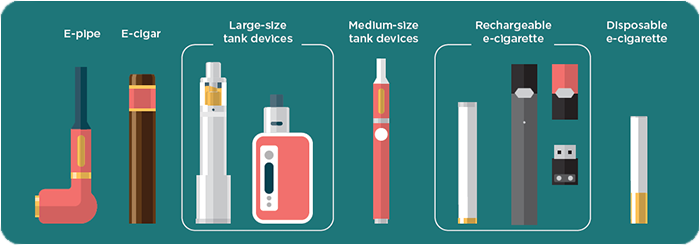E-cigarettes usually contain nicotine and may have other harmful substances too. There’s a lot of conflicting information about them. We still have a lot to learn, but here’s what we currently know.

E-cigarettes are known by many different names. They are often called e-cigs, e-hookahs, vapes, vape pens, tank systems, or mods. They come in many different shapes and sizes—some look like a regular cigarette, some look very different. There is a lot of talk about e-cigarettes. Some of it is true, but some of it is not.
You may have seen ads or stories on the internet that say e-cigarettes are not harmful, or are a good way to help smokers quit smoking. However, doctors and researchers still have a lot to learn about the health effects of e-cigarettes. While e-cigarettes may be less harmful than regular cigarettes, this does not mean that they are harmless.

What are e-cigarettes?
E-cigarettes are battery-powered devices that work by heating a liquid into an aerosol that the user inhales and exhales. The e-cigarette liquid typically contains nicotine, propylene glycol, glycerin, flavorings, and other chemicals. Nicotine is the addictive drug found in regular cigarettes and other tobacco products. Research shows that e-cigarette aerosol often contains substances that can be harmful, including flavoring chemicals (like diacetyl, which is linked to lung disease), metals (like lead), and other cancer-causing chemicals.
Are e-cigarettes regulated?
Companies that make or sell e-cigarettes must follow certain Food and Drug Administration (FDA) regulations. For example, only people age 21 and over are allowed to buy e-cigarettes. Researchers are working hard to gather more information about e-cigarettes and how they are used. This information may lead to additional regulations and could be helpful for informing the public about what’s in e-cigarettes and the potential health risks of using them.
What are the known health risks of e-cigs?
Compared with regular cigarettes, e-cigarettes have been on the market a short time—about 11 years. Scientists are studying e-cigarettes to understand how using them affects people’s health. Here’s what doctors and researchers know right now:
E-cigarettes usually contain nicotine. Nicotine is what makes tobacco products addictive. Be aware that some e-cigarettes that claim to be nicotine-free have been found to contain nicotine.
E-cigarettes are harmful for youth, young adults, and pregnant women. The nicotine in e-cigarettes is harmful for developing babies, and can lead to addiction and harm brain development in children and young adults into their early 20s. Although there is still much to learn about e-cigarettes, the evidence is clear that the harmful health effects of using e-cigarettes means teens and young adults should not use them.
E-cigarettes may contain other harmful substances. While e-cigarettes typically have fewer chemicals than regular cigarettes, they may still contain heavy metals like lead, flavorings linked to lung disease, small particles that can be inhaled deep into the lungs, and cancer-causing chemicals. Being near someone using an e-cigarette can expose you to the aerosol and the chemicals in it. This is similar to secondhand smoke from regular cigarettes.
Can e-cigarettes help people quit smoking?
E-cigarettes are not approved by the FDA as a quit smoking aid. So far, the research shows there is limited evidence that e-cigarettes are effective for helping smokers quit. There are other proven, safe, and effective methods for quitting smoking. One way to start is to talk with your doctor, nurse, or a trained quitline counselor to figure out the best strategies for you.
Many people use quit smoking medication, like nicotine replacement therapy (NRT), in the form of a patch or gum, which doctors and other experts agree is one of the most helpful tools smokers can use to quit. You can also get free, effective support:
- Try a text message program. Sign up for SmokefreeTXT online or text QUIT to 47848.
- Download a smartphone app. Our free apps help you track cravings and understand your smoking patterns.
- Talk to an expert at a quitline. Call the National Cancer Institute Quitline at 1-877-44U-QUIT (1-877-448-7848) Monday through Friday from 9:00 a.m. to 9:00 p.m. or find your state’s quitline by calling 1-800-QUIT-NOW (1-800-784-8669).
- Chat with a quit smoking counselor. LiveHelp is Monday through Friday, 9:00 a.m. to 9:00 p.m. Eastern time. LiveHelp is also available in Spanish.
The combination of medication and support is known to increase the chance of quitting for good. Explore your options and find a quit method that’s right for you.








